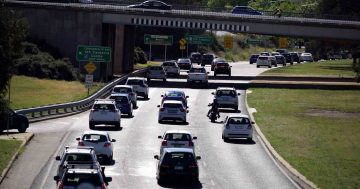
Chief Minister Andrew Barr: “This won’t fix itself and it does require the active intervention of government”. Photo: Michelle Kroll.
The ACT’s budget deficit has blown out to a record level and will hit a peak in 2020-21 of more than $900 million as the government spends up big to counter the impacts of the COVID-19 pandemic on the economy.
The government has released a budget update dripping with red ink but says that without the extra spending and concessions to stimulate the economy the situation in the Territory would be much worse.
”It would mean a deeper recession, it would mean deeper budget deficits over a longer period of time, a lot of misery and unemployment and a longer and slower path to recovery,” Chief Minister and Treasurer Andrew Barr said.
“This won’t fix itself and it does require the active intervention of government.”
Driving this is the government’s $4.9 billion infrastructure program over four years which Mr Barr says will deliver a pipeline of work to the construction industry and create hundreds of jobs.
Asked whether the government would call in some projects if they faced too many delays, Mr Barr said those powers were rarely used but he would not rule the action out, given the public benefit involved.
He said the ACT public should not be alarmed at a budget deficit approaching a billion dollars.
”If the Commonwealth Government can run a $185 billion deficit then it is entirely appropriate for the ACT Government to be in deficit at this time,” he said.
Mr Barr said the government still had plenty of shots in the locker if the economy need more stimulus, citing the ACT’s AAA credit rating, strong balance sheet, and the RBA’s intervention to ensure money could be borrowed at record low interest rates for at least the next three years.
The government’s budget strategy mirrors that of other jurisdictions and the Commonwealth to keep businesses afloat, create jobs and support people affected by the restrictions to contain the pandemic.
Nonetheless the numbers are not pretty, and blow last year’s pre-pandemic estimates out of the water into irrelevance.
The deficit has more than doubled from the mid-year review figure of $255 million to $690.5 million, and is expected to hit $909.5 million next year before tapering to about $400 million in 2023-24 under Treasury’s baseline scenario, in which social distancing is eased and international borders reopen by July 2021, borders with NSW and Victoria remain closed but freight is allowed through, and population growth slows due to a cut in migration.
Treasury has also modelled upside and downside scenarios that provide better and worse outcomes.
Net debt has hit $3.3 billion, will grow to $4.7 billion in 2020-21 and by 2023-24 will be $7.7 billion.
The update shows debt has reached 7.7 per cent of Gross State Product and by 2023-24 will be 15.6 per cent.
Revenue is down everywhere with the GST payments shrinking by $974.3 million over four years along with the national economy, and land sale contributions falling short by $483.9 million.
Tax revenue is also expected to decline by $412.2 million over four years as a result of COVID-19 impacts on economic activity.
Housing has been resilient and will benefit further from an easing of restrictions, supported by record low interest rates, and ACT and Commonwealth government stimulus programs, although lower population growth will be a dampener.
”The magnitude of the current fiscal shock is easily the most significant faced in the Territory’s history,” the budget update says.
”The outlook for investment returns continues to be challenging, with increasing economic uncertainty and financial market volatility amid the COVID-19 pandemic.”
Original Article published by Ian Bushnell on The RiotACT.













